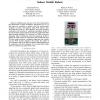Free Online Productivity Tools
i2Speak
i2Symbol
i2OCR
iTex2Img
iWeb2Print
iWeb2Shot
i2Type
iPdf2Split
iPdf2Merge
i2Bopomofo
i2Arabic
i2Style
i2Image
i2PDF
iLatex2Rtf
Sci2ools
ICRA
2010
IEEE
2010
IEEE
WiFi localization and navigation for autonomous indoor mobile robots
— Building upon previous work that demonstrates the effectiveness of WiFi localization information per se, in this paper we contribute a mobile robot that autonomously navigates in indoor environments using WiFi sensory data. We model the world as a WiFi signature map with geometric constraints and introduce a continuous perceptual model of the environment generated from the discrete graph-based WiFi signal strength sampling. We contribute our WiFi localization algorithm which continuously uses the perceptual model to update the robot location in conjunction with its odometry data. We then briefly introduce a navigation approach that robustly uses the WiFi location estimates. We present the results of our exhaustive tests of the WiFi localization independently and in conjunction with the navigation of our custom-built mobile robot in extensive long autonomous runs.
Related Content
| Added | 26 Jan 2011 |
| Updated | 26 Jan 2011 |
| Type | Journal |
| Year | 2010 |
| Where | ICRA |
| Authors | Joydeep Biswas, Manuela M. Veloso |
Comments (0)

